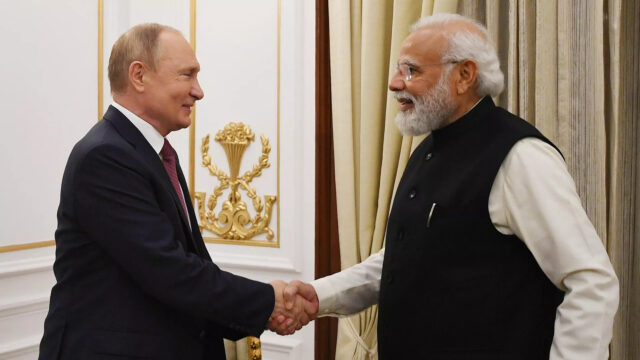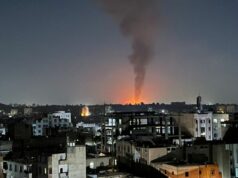Russia and India are strengthening their ties despite the slew of anti-Moscow sanctions which have been imposed by the West. In an exclusive interview with Sputnik, Russia’s Ambassador to India Denis Alipov expanded on the results of the XIV BRICS Summit, relations between Moscow and New Delhi and more.
Sputnik: How do you assess the results of the XIV BRICS Summit for Russia and India?
Denis Alipov: The XIV BRICS Summit held on 23 June this year was certainly another significant step in the development of the BRICS [Brazil, Russia, India, China and South Africa] grouping, which in essence reflects the formation of a new reality in international relations – the transition from a unipolar system to a polycentric world order.
The important thing is that, against the backdrop of geopolitical collisions, the five countries send a powerful message of common understanding of global processes – from reforming the multilateral system of economic governance to the situation in disarmament and non-proliferation, information security, counter-terrorism and other challenges. There was a clear consensus against arbitrary sanctions, which are the exclusive prerogative of the UN Security Council. We also shared a disapproval of the distorting effects of any discriminatory measures in international trade, which mainly affect developing countries.
Of course, our main target now is to build a smooth and reliable system of mutual settlements as an alternative to a compromised mechanism based on the dominance of the US dollar. We suggest developing a new international currency, to connect the banks of the BRICS countries to the Russian System for Transfer of Financial Messages, SPFS (a SWIFT analogue), to integrate national payment systems into a unified network for cross-border clearing settlements.
Sputnik: How does India and China’s interaction within the BRICS framework unfold against the backdrop of the territorial dispute between the two countries in Ladakh? And how does this disagreement generally affect how the ‘Five’ interact and work with each other? Chinese Foreign Minister Wang Yi on Wednesday said that “common interests of India and China ‘far outweigh’ the differences” at a meeting with India’s ambassador to Beijing – is that really true?
Denis Alipov: Interaction within BRICS is mature and constructive. The active participation of India and China in all BRICS events this year clearly demonstrates this. The most important thing is that the member states use this platform not to antagonize each other but to promote mutually beneficial cooperation and synergy of interests.
The “Five” offer an extensive common agenda on these very foundations, that in one way or other will also contribute to overcoming bilateral disagreements.
Sputnik: Does BRICS plan to expand in the near future (according to media reports, China is in favour of this), and how do Russia and India view this?
Denis Alipov: The interest of like-minded countries in the “Five” is proof positive of how inclusive the association is, its openness to cooperation with all constructively minded partners, ready to seek answers to the challenges which are facing the international community at present.
Russian Foreign Minister Sergey Lavrov stressed that the discussion of BRICS expansion is justified and timely. The idea itself received principled support at the XIV BRICS Summit. Another thing to remember is that haste in this matter may be counterproductive. It is necessary to think in detail about the principles, standards and procedures of such a process, which should be developed through debate and by consensus. The main thing is that the accession of new members will help to increase the effectiveness and practical impact of the “Five’s” activities.
Sputnik: India has recently come under pressure from the West because of its balanced stance on Russia’s special military operation in Ukraine. Have the anti-Russian sanctions affected the cooperation between Moscow and New Delhi? And have you personally noticed any changes in the Indian position?
Denis Alipov: The partnership between Russia and India rests on a deep strategic foundation, drawing its strengths not only from strong historical roots, but also on a coinciding vision of the future world order. As you see, the external conjunction is incapable of affecting our relations in any meaningful way. We have regularly seen evidence of this in statements by the Indian leadership in recent months.
We are grateful to New Delhi for its objective assessment of the Ukrainian events. Clearly, they understand the background of the present geopolitical and geo-economic situation and the forced nature of Russia’s actions in Ukraine. They see the destructive role of illegitimate restrictions in the genesis of the present global food and energy crisis, the responsibility for which the West seeks to place entirely on our country.
India does not support attempts to isolate Russia in multilateral forums and is critical of the West’s wish to reduce the international agenda to the conflict in question, ignoring other key global and regional problems, which the West itself has exacerbated significantly. The pressure exerted by the West, aggressively imposing its conditions about who one can and cannot be friends with, causes the rejection of such diktat.
At the same time, we must be realistic about what is happening: India is interested in developing cooperation with the rest of the world, including the United States and Europe. National interests and the need to preserve strategic autonomy guide the Indians in their actions, rejecting the very idea of dividing lines and the paradigm of bloc confrontation.
Sputnik: In December 2021, Russia and India outlined many new goals for cooperation, including doubling mutual trade and investment. How realistic do these goals now seem?
Denis Alipov: First and foremost, it should be noted that the goals outlined in December 2021 at the annual bilateral summit in New Delhi are fully consistent with the enormous potential of our relations. The India-Russia partnership operates on all sorts of levels. We are expanding cooperation in communications, diamond processing, forestry, healthcare and pharmaceuticals, tourism, railroads, metallurgy, civil aviation, shipbuilding and oil refining. Our military and military-technical cooperation is being strengthened. We are progressively implementing the plans adopted at the 2019 Vladivostok Summit to work together in the Far Eastern and Arctic regions, and we are building up cooperation in the trade, economic, investment, banking and financial sectors.
The dynamics of bilateral trade speak for itself. According to India’s statistics, from January to April 2022, it amounted to $6.4 billion. This is almost twice as much as for the same period last year. If we maintain these volumes throughout the year, we will have a turnover of more than $19 billion by the end of 2022. To put this in context, let me remind you that in the previous year we had an absolute record of $13.6 billion.
I expect that despite the West’s sanctions against Russia, the positive dynamics of trade will continue. Unfortunately, in the first months after the launch of the special military operation in Ukraine there were certain difficulties with supplying Russian goods to India and vice versa. However, today we have successfully overcome most of these barriers. We are confident that Indian exports to Russia (including science-intensive ones) will gain momentum in the near future.
Our main task today is to adjust our trade and economic relations to the new realities, to synchronize the payment systems of the two countries, giving priority to the increased use of national currencies.
(By arrangement with Sputnik)





